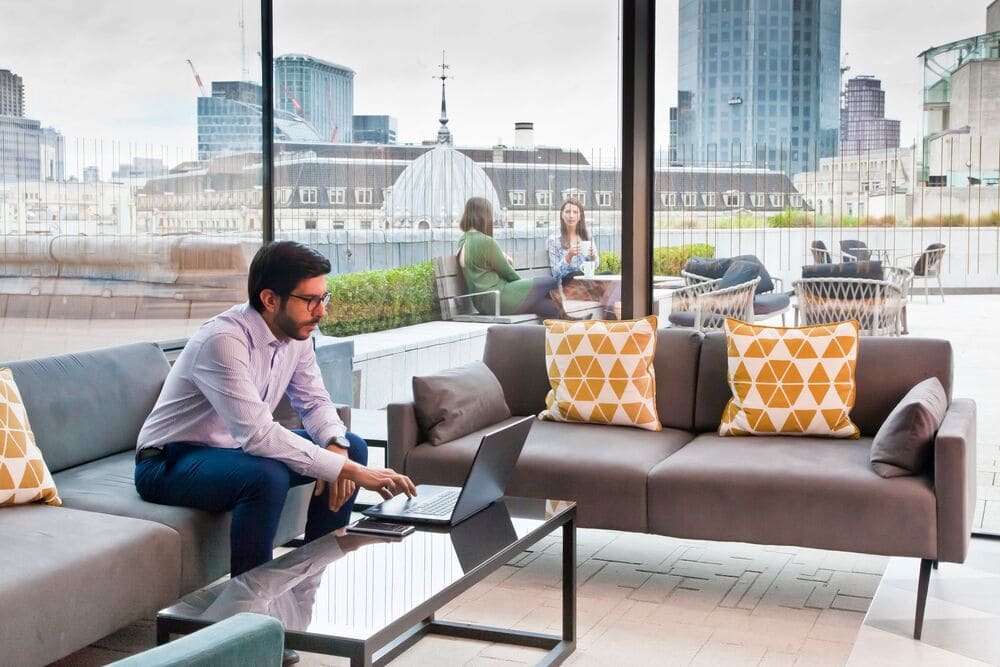During the pandemic, there was a monumental change in the way we worked – we shifted from working in the office to our homes. In fact, in April 2020, almost half of people in employment worked from home at least in part. Today, in a post-COVID working environment, this shift has started to reverse. According to a recent report by Resonate, 22% of people are now back working in the office 5 days a week, with a further 39% doing 3-4 days. However, these numbers have still not returned to pre-pandemic levels.
Here at Argyll, we’ve been operating office spaces across London for over 25 years, and we understand the benefits that working in an office can present to employees and businesses, from facilitating collaboration to a better work-life balance. In this post, we’ll examine the top advantages of working in the office and how companies can encourage more employees to do so.
Top 12 advantages of working in the office
Here are the top 12 benefits of working in the office for both employees and employers alike.
Benefits of working in the office for employees
1. Collaboration
There’s no doubt working in an office environment facilitates collaboration. In a practical sense, an office is designed to make working together easier. Offices have dedicated meeting rooms for formal collaboration and decision-making and more relaxed spaces ideal for brainstorming in smaller teams. An open-plan style office can make collaboration even easier, allowing for quick interactions and spontaneous teamwork.
Office working also fosters better relationships and improved communication between team members, making collaboration more natural and productive. In the office, colleagues work more closely, and it’s easier to bounce ideas off one another and appreciate different points of view. Employees can also see what other teams do and how they work, which can lead to a more rounded view of business needs, processes and objectives.
2. Access to superior resources
Businesses invest heavily in facilities and technology, so working in the office gives employees access to better resources and more of them. A far cry from the glitchy connections and fuzzy webcams of home. I, in the office, employees have access to everything they need to perform their job effectively and efficiently, from high-tech computers and presentation equipment to quality video conferencing and super-fast Wi-Fi.
The superior resources available in the office also create a more comfortable workspace. Ergonomically designed furniture, temperature control and adequate lighting can all help boost comfort, creativity and productivity.
3. Clear work-life separation
When working from home, it can be hard to switch off at the end of the day. Spending the day in the office, however, creates a clear boundary between work and home, meaning people are more likely to mentally leave work behind at the office. What’s more, venturing out of the house and travelling to work helps establish a routine, giving people time to prepare for the day ahead and then disconnect on the way home.
4. Professional development opportunities
Working in the office benefits employees by creating better opportunities for professional development. Working in the office is an enriching experience where people learn from one another and gain inspiration. Even subtly, employees can pick up cues of company culture and ways of doing that may otherwise be missed when isolated at home. It also makes individuals more visible across teams and hierarchical levels, so they stay at the forefront of people’s minds when opportunities arise.

Benefits of working in the office for employers
5. Productivity
For employers, one of the main advantages of having employees working in the office rather than at home is improved productivity. In a professional workplace, there are fewer distractions and employees can focus on what they are doing. In addition, when immersed in the energy and creativity of others, employees can be more motivated, complete tasks quicker, and solve problems more readily.
6. Networking opportunities
Working in the office presents more networking opportunities than operating from home. In an exclusive office, employees may meet clients who visit colleagues and superiors, laying the foundations for future opportunities and potential collaborations. In an office environment, employees can also network cross-functionally, meeting colleagues who may form part of future teams and who can provide targeted support when needed.
And if the office is a coworking space, the networking opportunities are exponential. Working in a shared office brings together individuals from diverse industries and backgrounds, creating opportunities to connect with potential clients, discover suppliers, identify emerging talent, and foster collaborative partnerships.
7. Faster skill development
Surrounded by knowledgeable and experienced colleagues, employees can develop skills more quickly as they have access to all the resources, technology and support they need to facilitate learning. The freer communication of an office also allows people to ask questions more readily. When working from home, they may try to overcome problems on their own which can slow learning, whereas asking a colleague can resolve an issue in minutes.
8. Greater visibility of employees
From an employer’s point of view, having your team working in an office makes them more visible. You can see how they are progressing against tasks and help keep them on track. You’ll also have a better handle on who is doing what and a more holistic view of a team’s progress towards specific goals. In the office, employers may also find that they get to know each team member and their skills better, helping them recognise strengths and weaknesses and support growth and development.
Benefits of working in the office for mental health
9. Support and guidance
Undoubtedly, working in an office allows people more access to support and guidance than when working alone. The improved collaboration and communication make seeking help when needed much easier, on both a professional and personal level. Issues can be addressed quickly and employee needs met, allowing employers to provide training, intervention or support as required. Ultimately, this will lead to a happier, more productive, and better-skilled team.
10. Team bonding
Working in the office can benefit people’s mental health by creating an environment in which teams can bond and flourish. Working together towards common goals gives people a sense of belonging, and informal interactions during breaks or in passing promote friendships and better working relationships.
11. More structure
Having a clear place of work adds structure and routine to the day which can also help mental well-being. Working in the office gives a defined beginning and end to the day, creating clear switch-off times, which may help people manage stress levels. During the day, the to-ing and fro-ing of others can help build structure into people’s day too, prompting them to take regular breaks when they would otherwise forget.
12. Human conversations and interactions
Working from home can be lonely. Back in 2020, a survey discovered that 25% of people struggled with loneliness and isolation from their coworkers when working from home. Working in the office, however, gives people real human conversations and interactions, both informally and formally. This can help keep people connected, build better relationships and regulate stress levels.

How to get employees back in the office
Although the tide is turning and more people are heading back into the office, some still prefer to work from home. Here are some ways your business can help get employees back in the office.
Create a warm and welcoming office environment
Ensure your office space is a warm, inviting and pleasant space to spend the day. People want comfortable desks and seating areas, private spaces for more intimate discussions, and meeting rooms which facilitate teamwork and collaboration. You also need to be mindful of lighting, noise and temperature as getting these right can influence people’s mood, productivity and comfort levels.
At Argyll, we work hard to ensure our offices create an ambience in which people feel comfortable and proud to work. Housed in iconic properties from Mayfair to Marylebone, our fully equipped meeting rooms exude professional sophistication and the desk spaces are the epitome of comfort and style. We also offer exclusive lounges, private video conferencing spaces, administration services, high-speed internet, and well-appointed kitchens to meet daily work needs.
Provide perks to boost employee well-being
To encourage employees back into the office, think about how you can add value and support people’s well-being. Organise team days where people leave the stress of the office behind and focus on bonding and relationship building. Consider offering well-being sessions at your offices within the working day, such as yoga or meditation, and promote shared break times within the team. You could also encourage employees to keep physically active by participating in schemes like cycle-to-work.
At Argyll, our properties have a range of facilities that can help support well-being initiatives, including calm outdoor spaces where employees can recharge and tranquil indoor settings ideal for well-being sessions. We also welcome dogs at most of our properties, and we have shower rooms with complimentary toiletries, and secure bike parking for those who like to keep physically active.
Choose the right office location
Consider the location of your office and whether this is accessible for your employees. Is it close to Tube stations and bus stops? Are there restaurants and cafés nearby that employees could go to with colleagues to bond over lunch or coffee?
Accessibility aside, think about whether your office location is somewhere your employees would be proud to work. At Argyll, we have landmark offices across the capital with excellent transport links and unrivalled presence and style.
Leave room for flexibility
Allowing your employees flexibility may help encourage them back to the office. If they have been working remotely for some time, committing to a rigid five-day office schedule may be undesirable. Hybrid working and flexible hours could make the difference for some, allowing them to keep to family commitments and miss rush-hour traffic for example.
Also consider offering people flexibility in where they work within the office. Some employees may like the buzz of an open-plan office, while others crave the tranquillity of a quiet corner. Within our properties, for example, there are a range of spaces to choose from, both inside and out, so when working from one of Argyll’s offices, people can find the ideal space for their working style and needs.
Highlight the benefits for mental health
Ensure your employees understand how working from the office may support their mental well-being. As mentioned, working in the office can establish clearer boundaries between work and home and provide the human interactions and support employees need to thrive as part of a valued team.
Flexible office spaces in London from Argyll
Helping facilitate collaboration, build relationships, develop skills, and support mental well-being, there are clear benefits to working in the office when compared to working from home.
If you’re looking for an office space which provides the environment your business and employees need to flourish, contact our dedicated team today.




